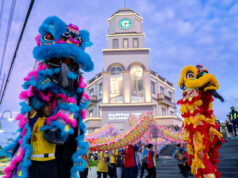Christmas inspires me to read anew the writings of mystic Maria Valtorta whose volumes initially called Poem of Man-God was once included in the Vatican’s list of condemned books. But God has ways to let known His very works, intended for some, if not for all.
Such is the stupendous (what word should I use to manifest amazement?) book of Maria Valtorta who is now being pushed for sainthood.Valtorta spent most of her life in bed, after a mentally imbalanced man hit her and caused her lameness.
During all those years, she, by Divine Power, had been transported in time to witness events in the lives of the Blessed Virgin and Jesus Christ, on top of being moved to the future to see an episode during the Final Judgement.
Valtorta was said to have come across the work of Blessed Anne Catherine Emmerich who was also similarly blessed in her lifetime, but was reported to have been shocked by it. Emmerich’s work, it seemed, was heavily filtered by ultra conservative Church leaders, so that much of truth was shaved.
Up to our times, there are critics, too, of Valtorta, but there is no shortage of scholars, religious and lay in various disciplines, who are astonished by the genius, if not signs that cannot but be divine in her work.
I am not a scholar, but I can fit in the latter category. Since it’s Christmas, I am here devoting this long excerpt on her account of the first Christmas. I am not using any quote for purposes of coping with deadline pressure inserting quotes can take time), but the direct quote starts in the next paragraph:
I see a very wide country. he moon is at its zenith and she is sailing smoothly in a sky crowded with stars. They look like diamond studs fixed to a huge canopy of dark blue velvet and the moon is smiling in the middle of them with her big white face, from which streams of light descend and make the earth white.
The barren trees seem taller and darker against so white a ground, whereas the low walls which rise here and there on the boundaries, look as white as milk and a little house far away seems a block of Carrara marble.
On my right I see a place enclosed by a thorn-bush hedge on two sides and by a low rugged wall on the other two. The wall supports a kind of low wide shed, which inside the enclosure is built in masonry and part in wood, as if in summer the wooden part should be removed and the shed should become a porch.
From the enclosure intermittent short bleatings can be heard now and gain. It must be the little sheep which dream or perhaps sense that it is almost daybreak because of he very bright moonlight.
The brightness is intense to an excessive degree and it is increasing more and more as if the planet were coming near the earth or were sparkling because of a mysterious fire.
A shepherd boy looks out of the door, and lifting one arm to his forehead to shield his eyes, he looks up. It seems improbable that one should protect one’s eyes from moonlight. But the moonlight in this case is so bright that it blinds people, particularly those who come out from a dark enclosure.
Everything is calm. But the bright moonlight is surprising. The shepherd calls his companions. They all come to the door: a group of hairy men of various ages. Some are just teenagers, some are already white haired. They comment on the strange event and the younger ones are afraid.
One in particular, a boy about twelve years old, starts crying, and the older shepherds jeer at him.“What are you afraid of, you fool?” the oldest man says to him. “Can’t you see that the air is very quiet? Have you never seen clear moonlight?
You have always been tied to your mother’s apron-strings, haven’t you? But there are many things for you to see! Once, I had gone as far as the Lebanon mountains, even farther. High up. I was young, and walking was a pleasure.
And I was also rich, then…one night I saw such a bright light that I thought Elijah was about to come back in his chariot of fire. And an old man—he was the old man then—said to me: “A great adventure is about to take place in the world”. It was for us a misadventure, because the Roman soldierscame.
Oh! Many things you will see, if you live…long enough.” But the little shepherd is no longer listening to him. He looks as if he is no longer frightened, because he leaves the threshold and steals from behind the shoulders of a brawny herdsman, behind whom he had previously sought shelter, and he goes out on to the grassy fold in front of the shed.
He looks up and walks about like a sleep-walker or one hypnotised by something that compellingly attracts him. At a certain moment he shouts: “Oh!” and remains petrified with his arms slightly stretched out. His mates look at one another dumbfounded.
“But what is the matter with the fool?” says one. “I will send him back to his mother tomorrow. I don’t want mad people here as guardians of the sheep” says another. And the old man who had spoken earlier says: “Let us go and see before we judge him.
Call also the others who are sleeping and bring your sticks. It might be a wild animal or some robber…” They go in, they call the other shepherds and they come out with torches and clubs.
They join the boy. “There, there” he whispers smiling. “Above the tree, look at the light that is coming. It seems to be coming on the ray of the moon. There it is, it is coming near. How beautiful it is!”
“I can only see a rather bright light.” “So can I.” “So can I” say the others. “No. I see something like a body” says one whom I recognize to be the shepherd who gave the milk to Mary.
“It is… it is an angel” shouts the boy. “Here he is, he is coming down, he is coming near… Down! On your knees before the angel of God!” A long and venerable “Oh!” comes from he group of shepherds who fall down face to the ground and the older they are, the more they appear to be crushed by the refulgent apparition.
The young ones are on their knees, looking at the angel who is coming nearer and nearer, and then he stops mid-air above the enclosure wall, waving his large wings, a pearly brightness in the white moonlight surrounding him.
“Do not fear. I am not bringing you misfortune. I announce you a great joy for the people of Israel and for all the people of the world.” The angelic voice is the harmony of a harp and of singing nightingales.
“Today, in the City of David, the Savior has been born.” In saying so, the angel spreads out his wings wider and wider, moving them as a sign of overwhelming joy, and a stream of golden sparks and precious stones seem to fall from them: a real rainbow describing a triumphal arch above the poor shed. “…the Savior, Who is Christ.”
The angel shines with a brighter light. His two wings, now motionless, pointed upright towards the sky like two still sails on the sapphire of the sea, seem two bright flames ascending to Heaven. “…Christ, the Lord!”
The angel gathers his sparkling wings and covers himself with them as if they were a coat of diamonds on a dress of pearls, he bows down in adoration, with his arms crossed over his heart, while his head bent down as it is, disappears in the shade of the tops of the folded wings.
Only an oblong bright motionless form can be seen for a few moments. But now he stirs. He spreads out his wings, lifts his head, bright with a heavenly smile, and says:
“You will recognise Him from the following signs: in a poor stable, behind Bethlehem, you will find a baby in swaddling clothes, in a manger for animals, because no roof was found for the Messiah in the city of David.” The angel becomes grave, almost sad, in saying that




